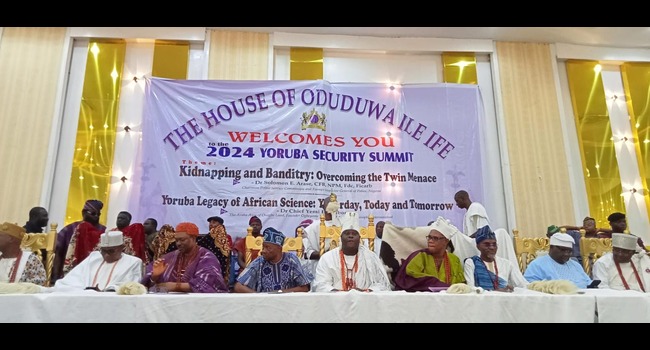By Ohuakanwa Chibuzo
The Southwest region of Nigeria has been grappling with a surge in insecurity, prompting Yoruba traditional rulers to convene the inaugural Yoruba Security Summit. Led by the esteemed Ooni of Ife, Oba Adeyeye Ogunwusi, the summit addressed growing concerns over safety, particularly in light of recent attacks on royal figures in Ekiti and Kwara states.
During the summit, which saw the participation of prominent monarchs including the Deji of Akure and the Akarigbo of Remo, Oba Ogunwusi stressed the importance of embracing traditional methods, including the use of supernatural powers, to ward off marauders and protect territorial integrity.
The gathering culminated in a unified stance to confront the region’s security challenges comprehensively. Key among the resolutions was a call to empower the Amotekun Corps, advocating for increased support, training, and recruitment of individuals familiar with local terrain to enhance operational effectiveness.
ALSO READ: Chris Sutton predicts wins for Liverpool, Man City, Arsenal
Furthermore, the summit underscored the significance of community involvement in security matters, urging the Yoruba people to take ownership of their forests, homelands, and farmlands. Traditional values were also highlighted as essential tools in combating criminal activities, with monarchs urged not to forsake cultural heritage in the face of adversity.
In a bid to integrate traditional leaders into the national security framework, the summit emphasized their pivotal role in maintaining peace and stability. Southwest governors were urged to foster regional collaboration through the organization of security summits to address shared concerns and coordinate efforts effectively. Monarchs were urged to preserve traditional Yoruba customs and leverage natural resources, including supernatural powers, to combat criminal activities effectively.
The resolutions underscore a collective determination among Yoruba leaders to reclaim control over their territories and uphold cherished cultural traditions amidst escalating insecurity. As stakeholders commit to proactive engagement, the implementation of these measures is anticipated to strengthen the region’s resilience and foster a safer environment for all inhabitants.













